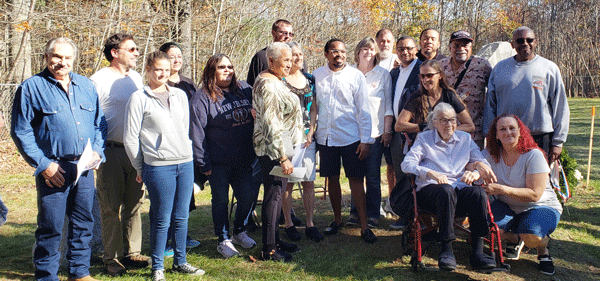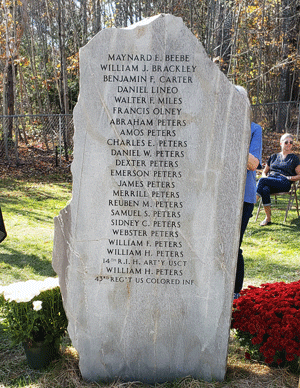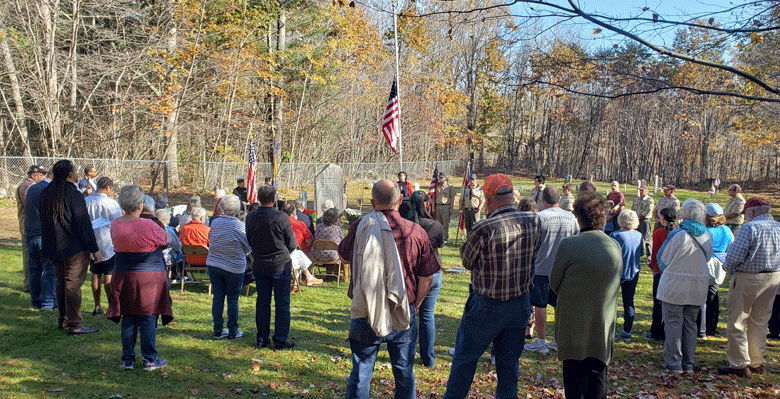
“My Lord, what a morning! / My Lord, what a morning! / Oh, my Lord, what a morning, / When the stars begin to fall.”
So sang Rev. Bette Bond on the last Saturday of October. With record-breaking warmth, a bluebird sky, and the warm russets and golds of leaves still clasping to trees, it was indeed a beautiful morning for the gathering of around 100 people at a little-known cemetery in Warren.
Those congregated at Peterborough Cemetery were there to celebrate the installation of a memorial stone and to remember and honor the military veterans resting in the burial grounds tucked into tall pines and oaks near South Pond in an area of Warren that once was home to the largest population of African Americans in Maine.
“We are on hallowed ground,” Amanda Shelmerdine, Warren’s sexton said in her opening remarks. “Our veterans came from humble beginnings. These men were farmers, mariners, mill workers, a hotelier, a barber, and a cook, born or settled within the Peterborough community. Each of them made an impact and contributed not only here but to our country.”
Through months of painstaking research, Shelmerdine identified 22 names of men and boys buried in the cemetery who served in the American Revolutionary War, the Spanish American War, World War I, World War II, and the Korean War.

Those names are carved on the back of a granite memorial stone placed at the entrance to the cemetery. The stone was donated by John Meyn, himself a veteran, enlisted for 20 years in the Air Force, who recently moved from Friendship to California..
When Meyn first arrived in Friendship with his wife in 2007, he became active in the local VFW, placing flags at veterans’ graves in Friendship and Cushing. He heard through word of mouth and in derogatory terms that African American veterans were buried in Warren, but couldn’t get much information about the community that once lived there.
In 2021, that changed. He saw an article about the Peterborough community in The Working Waterfront and that set him on a journey that he described in his remarks on Oct. 28 as “likely the best thing I’ve ever done.”
After receiving permission from the town of Warren, he arranged, at his own cost, to have sunken stones reseated and flag holders for the specific theaters of war placed at veterans’ graves. But he didn’t think that was enough. He offered to pay for a memorial stone, and the town of Warren accepted.
“Here is this group of fundamentally despised Americans who have served their country,” Meyn explained in an interview prior to the ceremony. “Theirs had to be a significant struggle, and yet, here’s the offspring of these families who are serving,” from the Civil War through the Korean War, “this country, which fundamentally despises them. And for me, that was mind-boggling.”
The Peterborough community was founded by Amos Peters, a Revolutionary War veteran, and his wife, Sarah, a former slave. For reasons unknown today, Revolutionary War general Henry Knox, who owned more than 500,000 acres of land in the region, gave Amos Peters 150 acres near South Pond in the 1780s.
“Here’s the offspring of these families who are serving this country, which fundamentally despises them.”
—John Meyn
There, the couple raised their family, and an interracial community built up around that family for generations until the 1950s when the last members of the Peterborough community left.
Today, the only physical reminder of Peterborough is the cemetery, although Shelmerdine and one of the community’s local descendants are searching for the foundations of the 1820s schoolhouse that served the community. Shelmerdine also hopes to one day use ground-penetrating radar to locate more graves that are known about anecdotally but for which the town doesn’t have records.
Descendants of the community who live in the area and out-of-state gathered for the memorial on Oct. 28, some meeting for the first time. Thomas Zeigler, a fifth-generation great-grandson of Amos and Sarah Peters who lives in Texas, spoke for the family.
“I’m amazed,” he said when he took the mic. “It’s amazing. I can speak for my family when I say we are overwhelmed by this great show of respect for the contribution of our family.”
Before the ceremony ended, a local Girl Scouts troop, which has for more than a decade placed and retired American flags at the graves of veterans in the cemetery each spring and fall, placed a wreath at the foot of the memorial stone, and Luis Cordero, a student at Medomak Valley High School, played “Taps.”
In his closing remarks, Meyn reflected on the racism that the Peterborough community endured, and which he noted still exists today. Peterborough “is really something to know about. Certainly, in a society that’s still trying to throw off the shackles of racism, we’ve still got steps to take, but look at this as a positive statement of who we are.”





